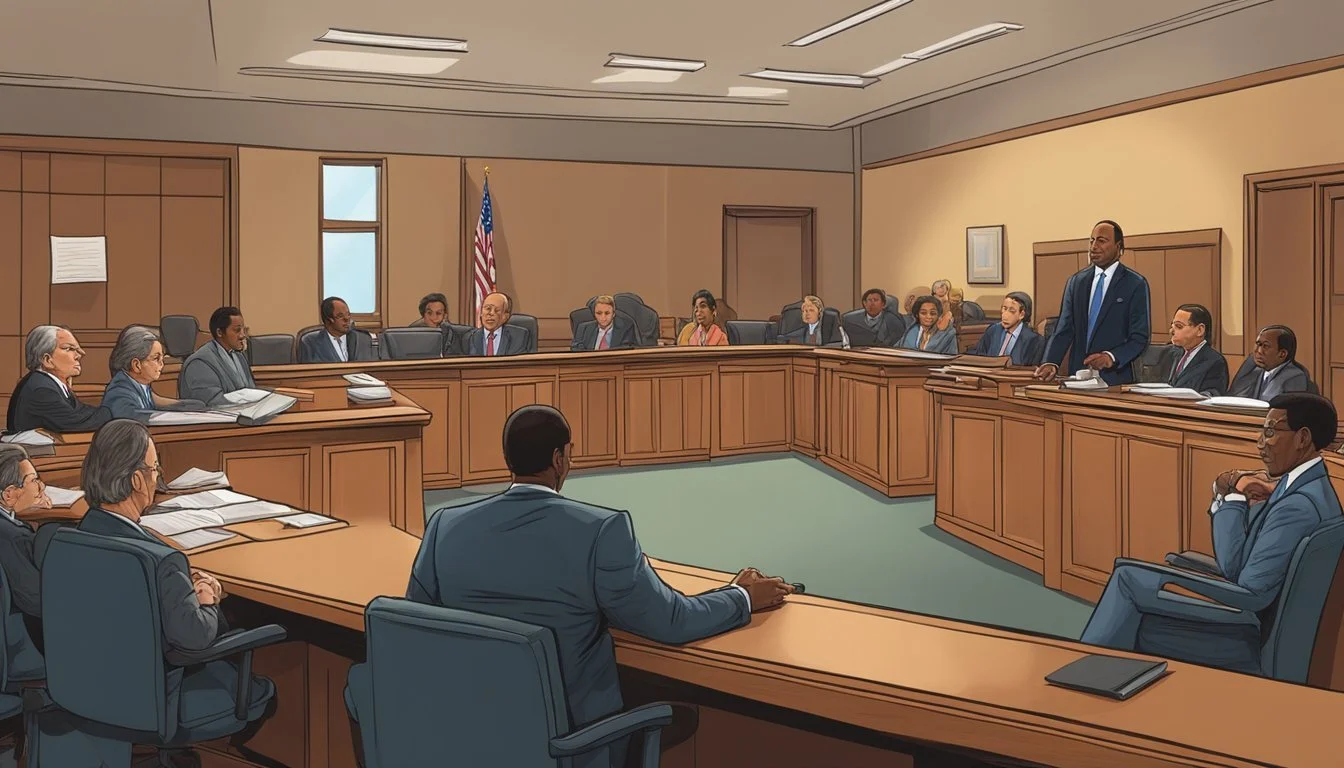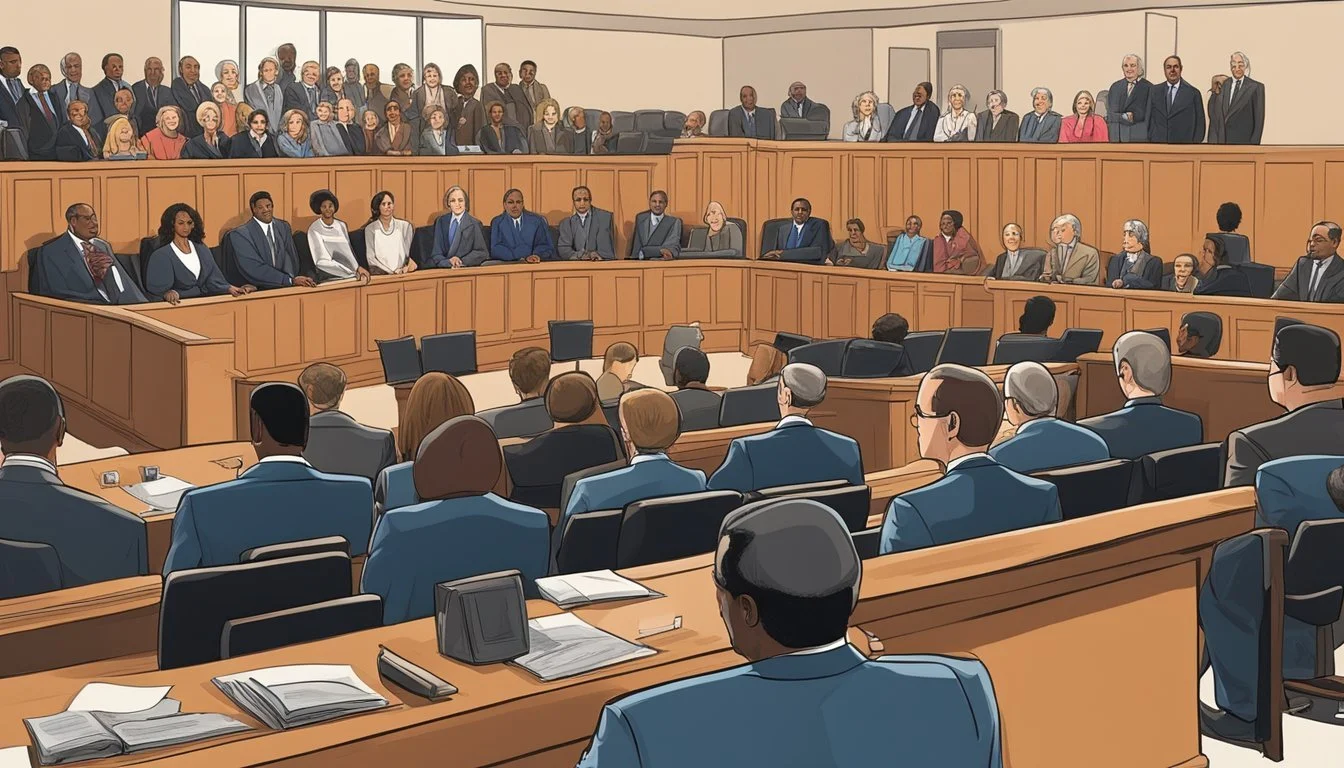Unmasking the Truth: Shocking Revelations in the New Documentary About O.J. Simpson!
The O.J. Simpson case captivated America in the mid-1990s, leaving an indelible mark on the nation's cultural landscape. Numerous documentaries have since explored this complex and controversial figure, offering viewers deeper insights into his life, career, and infamous murder trial.
These documentaries provide a comprehensive look at O.J. Simpson's rise to fame as a football star, his fall from grace, and the racial tensions exposed during his highly publicized trial. From ESPN's award-winning "O.J.: Made in America" to Netflix's recent addition of the "30 for 30" series, filmmakers have examined Simpson's story from various angles, shedding light on the societal issues that surrounded his case.
Documentaries about O.J. Simpson often delve into American culture, exploring themes of celebrity, race relations, and the justice system. These films offer viewers a chance to revisit one of the most talked-about cases in U.S. history, presenting new evidence, expert analyses, and previously unseen footage that continues to spark discussions about Simpson's legacy and its impact on society.
The Life of O.J. Simpson
O.J. Simpson's life trajectory took him from a humble beginning to the heights of fame and success, followed by a dramatic fall from grace. His journey encompassed remarkable athletic achievements, a transition to entertainment, and complex personal relationships.
Rise to Fame
O.J. Simpson was born in San Francisco in 1947. He overcame early struggles with rickets to become a standout athlete in high school. Simpson's football talents earned him a scholarship to the University of Southern California.
At USC, Simpson's gridiron prowess blossomed. He won the Heisman Trophy in 1968, cementing his status as college football's top player. His electrifying runs and charismatic personality made him a fan favorite.
Simpson's college success set the stage for his professional career. He was drafted first overall by the Buffalo Bills in 1969, entering the NFL with high expectations.
NFL Stardom and Acting Career
Simpson's NFL career lived up to the hype. He became the first player to rush for over 2,000 yards in a season in 1973. His speed and agility earned him the nickname "The Juice."
Key NFL achievements:
6-time Pro Bowl selection
NFL MVP (1973)
Rushed for 11,236 career yards
Post-retirement, Simpson transitioned to acting and broadcasting. He appeared in films like "The Towering Inferno" and "The Naked Gun" series. His charisma and fame made him a successful product spokesperson, most notably for Hertz rental cars.
Personal Life and Relationships
Simpson married Marguerite Whitley in 1967. They had three children together before divorcing in 1979. In 1985, he married Nicole Brown, with whom he had two children.
His relationship with Brown was tumultuous. They divorced in 1992 amid allegations of domestic abuse. Simpson's personal life became public spectacle in 1994 when he was charged with the murders of Nicole Brown and Ronald Goldman.
The highly publicized trial ended in Simpson's acquittal in 1995. However, his reputation was irreparably damaged. A civil trial in 1997 found him liable for the deaths, further complicating his legacy.
The Trials of O.J. Simpson
The O.J. Simpson trials captivated the nation, becoming one of the most high-profile legal cases in American history. The proceedings exposed deep racial divides and scrutinized the criminal justice system.
Murder Trial of Nicole Brown Simpson and Ron Goldman
On June 12, 1994, Nicole Brown Simpson and Ron Goldman were found stabbed to death outside Nicole's home in Los Angeles. O.J. Simpson, Nicole's ex-husband and former NFL star, quickly became the prime suspect.
The trial began on January 24, 1995, and lasted nearly nine months. Prosecution evidence included DNA analysis and a bloody glove found at the crime scene.
The defense team, led by Johnnie Cochran, Robert Shapiro, and F. Lee Bailey, challenged the evidence collection procedures and suggested police misconduct. Their strategy famously included the phrase, "If it doesn't fit, you must acquit," referring to a glove that appeared too small for Simpson's hand.
Media Coverage and Public Perception
The trial received unprecedented media attention, with live television coverage allowing millions to follow the proceedings daily. Court TV provided gavel-to-gavel coverage, while major networks interrupted regular programming for key moments.
This intense scrutiny led to the rise of legal commentators and armchair experts. Key figures like Judge Lance Ito, prosecutor Marcia Clark, and defense attorney Johnnie Cochran became household names.
Public opinion on Simpson's guilt or innocence often split along racial lines. Many African Americans viewed the case as emblematic of systemic racism in law enforcement, while many white Americans saw the evidence as overwhelmingly pointing to Simpson's guilt.
Criminal Justice Proceedings and Acquittal
The trial highlighted issues within the Los Angeles Police Department, including allegations of evidence mishandling and racial bias. Detective Mark Fuhrman's use of racial slurs became a focal point for the defense.
On October 3, 1995, after less than four hours of deliberation, the jury returned a verdict of not guilty on both murder charges. The acquittal shocked many observers who believed the evidence clearly pointed to Simpson's guilt.
The verdict's impact extended beyond the courtroom, sparking debates about race, celebrity, and the American justice system. While Simpson avoided criminal conviction, he faced a civil trial in 1997, where he was found liable for the deaths and ordered to pay $33.5 million in damages.
Documentaries and Series on O.J. Simpson
The O.J. Simpson case has inspired numerous documentaries and series, captivating audiences with in-depth explorations of the trial and its cultural impact. These productions offer unique perspectives on the events and their aftermath.
Critical Acclaim and Awards
"O.J.: Made in America" received widespread acclaim from critics and viewers alike. The documentary won the Academy Award for Best Documentary Feature in 2017. It holds an impressive 8.9 rating on IMDb, reflecting its popularity among audiences.
The series' success highlighted the enduring public interest in the O.J. Simpson case. Its comprehensive approach and historical context set a new standard for true crime documentaries.
Ezra Edelman's 'O.J.: Made in America'
Ezra Edelman directed the five-part documentary series "O.J.: Made in America" for ESPN's 30 for 30 series. The documentary provides a thorough examination of Simpson's life, from his upbringing in San Francisco to his football career and later acting pursuits.
The series delves into the complexities of race, celebrity, and the American justice system. It offers a nuanced look at Simpson's rise to fame and his eventual downfall.
ESPN's 30 for 30 Series
ESPN's 30 for 30 series has featured multiple documentaries about O.J. Simpson. These productions offer diverse perspectives on Simpson's life and career.
The series explores various aspects of the case, including:
Simpson's football achievements
His transition to acting and media personality
The infamous trial and its aftermath
ESPN's commitment to high-quality sports documentaries has made it a go-to source for in-depth coverage of the Simpson saga.
Ryan Murphy's Scripted Series
Ryan Murphy created the scripted anthology series "American Crime Story," with its first season titled "The People v. O.J. Simpson." This dramatized retelling of the trial garnered critical acclaim and numerous awards.
The series features a star-studded cast, bringing key figures from the trial to life. It explores the legal strategies, media frenzy, and personal dramas surrounding the case.
Murphy's approach offers a blend of factual events and dramatic interpretation, providing viewers with a compelling narrative of the trial's complexities.
Cultural Impact and Issues
The O.J. Simpson case profoundly shaped American society, highlighting deep-rooted issues of race, celebrity, and justice. It exposed racial divides, challenged perceptions of fame and criminal proceedings, and transformed media coverage of high-profile trials.
Race Relations and Racial Tension
The trial exposed and exacerbated racial tensions in America. Many African Americans viewed the case through the lens of historical injustices and police brutality. For them, Simpson's acquittal represented a rare victory against a system perceived as biased.
White Americans often saw the case differently, focusing on the evidence and expressing shock at the verdict. This stark divide in perspectives highlighted the ongoing racial schism in the country.
The case became a catalyst for discussions about systemic racism and inequality in the justice system. It forced America to confront uncomfortable truths about its racial landscape.
Celebrity and the Criminal Justice System
Simpson's fame played a crucial role in the trial and its aftermath. His status as a beloved sports icon and actor influenced public perception and legal strategies.
The case raised questions about preferential treatment for celebrities in the justice system. Simpson's ability to afford a "dream team" of high-profile lawyers contrasted sharply with the experiences of many defendants.
This disparity sparked debates about equality before the law and the influence of wealth and fame on legal outcomes. The trial became a symbol of how celebrity status can intersect with and potentially distort the judicial process.
Media's Role in Shaping Public Opinion
The Simpson trial marked a turning point in media coverage of legal proceedings. 24-hour news networks provided unprecedented, gavel-to-gavel coverage, turning the case into a national spectacle.
This intense scrutiny influenced public opinion and potentially affected the trial's outcome. The media's focus on sensational aspects often overshadowed important legal details.
The case popularized legal commentary as entertainment, blurring lines between news and spectacle. It set a precedent for how high-profile cases would be covered in the future.
Impact on the Black Community
Simpson's relationship with the Black community was complex. Before the trial, he had largely distanced himself from racial issues. The case thrust him into the center of racial discourse.
Many African Americans rallied behind Simpson, seeing his acquittal as a symbolic victory. However, this support was not universal and often conflicted with views on domestic violence.
The trial sparked debates within the Black community about celebrity, responsibility, and representation. It challenged notions of racial solidarity and highlighted divisions based on class and gender.
Long after the verdict, the case continued to influence discussions about race, justice, and celebrity in Black America.
The Aftermath and Continuing Legacy
The O.J. Simpson trial left an indelible mark on American culture, shaping public perceptions and sparking ongoing discussions about race, justice, and celebrity.
Public Sentiment Post-Trial
The verdict in the O.J. Simpson trial deeply divided public opinion. Many African Americans celebrated the not guilty verdict, viewing it as a rare instance of justice in a system often biased against them. In contrast, a significant portion of white Americans expressed shock and disbelief at the outcome.
This racial divide in public sentiment highlighted underlying tensions in American society. The case became a focal point for discussions about systemic racism, police misconduct, and the influence of wealth and fame in the justice system.
Media coverage of the trial's aftermath was extensive, with countless talk shows, news programs, and publications dissecting every aspect of the case and its implications.
O.J. Simpson's Life After the Verdict
Despite his acquittal, O.J. Simpson's life changed dramatically after the trial. He faced significant financial difficulties due to legal fees and civil lawsuit judgments. Simpson lost his home and many of his assets.
In 2007, Simpson was arrested in Las Vegas for armed robbery and kidnapping. He was convicted and sentenced to 33 years in prison, with the possibility of parole after 9 years. This incident further tarnished his public image.
Simpson was granted parole in 2017 and released from prison. Since then, he has maintained a relatively low profile, occasionally making headlines with controversial statements or social media posts.
Ongoing Conversations and Analysis
The Simpson trial continues to be a subject of intense interest and analysis. Numerous documentaries, books, and TV series have revisited the case, offering new perspectives and insights.
These works often explore the trial's impact on:
Legal practices and media coverage of high-profile cases
Race relations in America
The cult of celebrity and its influence on public opinion
Interviews with key figures from the trial, including lawyers, jurors, and witnesses, provide ongoing revelations and reflections on the case's significance.
The trial remains a touchstone in discussions about the American justice system, serving as a case study in law schools and sparking debates about reforms in criminal proceedings and media coverage of legal matters.
Discourse on Domestic Abuse and Violence
The O.J. Simpson case brought domestic abuse and violence into the national spotlight. Nicole Brown Simpson's experiences highlighted how even affluent, seemingly perfect relationships can mask serious abuse.
Police records showed multiple calls from Nicole reporting domestic incidents. Despite this, O.J. Simpson was only arrested once for abuse.
Many documentaries explore the cycle of violence Nicole endured. They reveal diary entries detailing physical assaults and threats. These personal accounts paint a chilling picture of escalating abuse behind closed doors.
The high-profile nature of the case sparked important conversations about domestic violence. It demonstrated how victims are often not believed or taken seriously, even when reaching out for help repeatedly.
This discourse led to some positive changes. Public awareness increased significantly. New policies and resources to support abuse victims emerged in the aftermath.
The documentaries serve as a sobering reminder that domestic violence can affect anyone, regardless of social status or public image. They emphasize the importance of recognizing warning signs and believing victims who come forward.
Policing and Law Enforcement Scrutiny
The O.J. Simpson trial cast a harsh spotlight on the Los Angeles Police Department (LAPD). It exposed deep-rooted issues within the organization and raised questions about police practices.
Detective Mark Fuhrman became a central figure in the case. His racist comments and questionable testimony undermined the prosecution's efforts and highlighted concerns about racial bias in policing.
The trial revealed flaws in evidence collection and handling procedures. This led to reforms in forensic practices and chain of custody protocols across many police departments.
Public trust in law enforcement took a significant hit. The case sparked debates about racial profiling, use of force, and accountability within police ranks.
The LAPD faced intense scrutiny over its history of racial tensions with the African-American community. This prompted efforts to improve community relations and increase diversity within the force.
Key changes implemented after the trial included:
Enhanced training on evidence handling
Stricter oversight of detective work
Improved transparency in police operations
The Simpson case remains a pivotal moment in discussions about policing in America. It continues to influence law enforcement policies and public perceptions of the criminal justice system.




